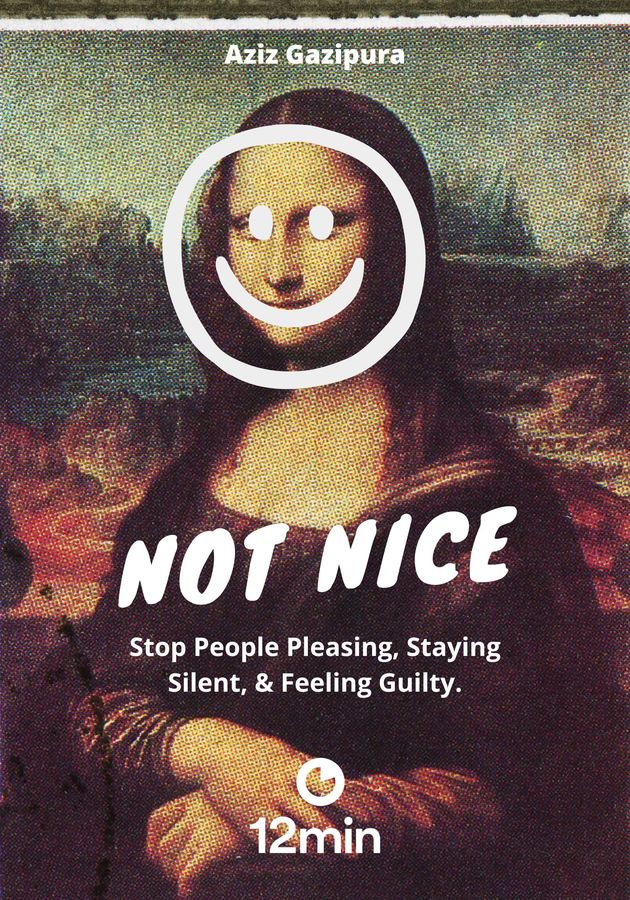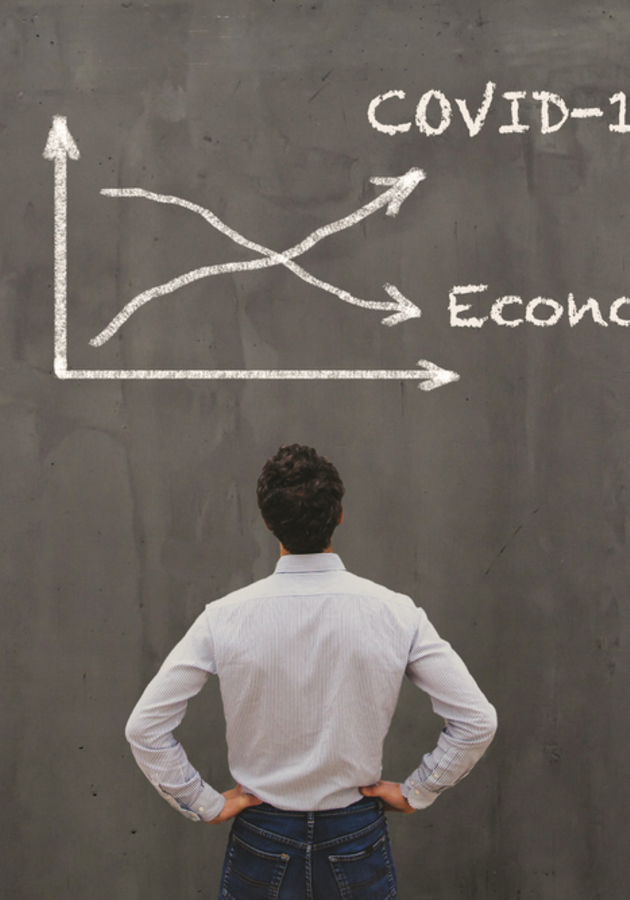As early as preschool and kindergarten, we are taught to be nice and polite. On the face of it, it’s difficult to find anything wrong with that. After all, if you asked someone what’s wrong with the world, it’s unlikely they would say “there’s just too many nice people around.” Even if nothing more, being nice means trying to do the right thing. It also means avoiding saying critical or mean things and putting other people’s happiness before yours. All of that must be good, mustn’t it? Well, after 14 years of clinical experience, Dr. Aziz Gazipura, one of the world’s leading experts on confidence, had to admit that it wasn’t. In “Not Nice,” he explains why. So, get ready to discover how important it might be to stop pleasing others, and prepare to learn how to break out of your niceness cage!
What is nice?
We use the word “nice” constantly, but rarely do we ever stop to think about it. And really, what does the word entail? Or, better yet, what does “being nice” mean in the real world? Is it about being polite and not hurting others or about something else entirely? In the opinion of Gazipura, it’s the latter. “At its core,” he writes, “being nice is about being liked by others by making everything smooth. No waves, no friction. It’s based on this (woefully inaccurate) theory: If I please others, give them everything they want, keep a low profile, and don’t ruffle feathers or create any discomfort, then others will like me, love me, and shower me with approval and anything else I want (promotions, sales, friendships, dates, sex, attention).”
In other words, even though niceness might seem driven by virtue, from the outside, it’s actually driven by fear and egoism – and of the worst kind imaginable because it benefits nobody. Nice people aren’t nice to others because they care for them so much, but because they think that by caring for other people, they would eventually get the things everybody wishes for the most in life: attention and love. Moreover, being disliked makes nice people feel very uncomfortable. That’s why, even though it may seem, superficially, that they are putting others before themselves, they are actually putting themselves first all the time, because almost everything people do in life, they do it to find some ease, comfort and relief.
Unfortunately, self-sacrificing is the worst way to put yourself first. Not only will you get nothing out of it, but you will also become toxic for the environment. Even though it may seem otherwise, regular folks don't actually like nice people, because nice people hide their opinions to avoid friction, avoid asking for what they want directly and because they prefer to conform and stick to established orders. Moreover, nice people feel overly responsible for everyone’s feelings, so they tend to be quite meddlesome and interfering. Above everything else, nice people are susceptible to being exploited by wicked individuals and manipulated into doing evil things. “Being nice does not come out of goodness or high morals,” concludes Gazipura. “It comes out of a fear of displeasing others and receiving their disapproval.”
The Approval Seeker
At its root, being nice is the upshoot of being insecure about your own potential and abilities. The fear of receiving other people’s disapproval is what drives nice people toward being nice. It’s not that other people don’t have an internal Approval Seeker influencing their thoughts and actions, but nice people are usually wholly identified with that single part of them. In everybody, the Approval Seeker has only two objectives: to avoid judgment, criticism and dislike at any cost, and to earn positive perceptions and feelings. In nice people, however, the Approval Seeker is looking to complete these two missions with absolute success. And since earning positive perceptions is far more difficult than avoiding criticism, nice people put almost all their effort in avoiding disapproval.
Consequently, they rarely say “no” to others for fear they might become upset. They also wait for the “right time” to say “the right thing” which makes them quite hesitant and timid in group gatherings. Many approval-seeking nice people have difficulty ending things, from conversations to friendships to romantic relationships. They are also overly agreeable so, regardless of their actual opinion on a subject, they tend to reply with smiles and nods. In groups, however, they can be quite irritating because they are the ones that laugh at everything, and at the most inappropriate times. Feeling pressured to entertain, nice people often tell the same stories over and over again, because they fear that a new one might not be as funny or as engaging as “the old hit.”
Approval seekers are also easily recognizable by their habitual apologizing and their submissive body language. In other words, they are the ones who say “sorry” even for minor transgressions, while looking away frequently, or keeping their eyes down. They are also the ones who’d rarely state their desires straightforwardly, preferring to rather hint at them from time to time in hope that the other person might detect them. Finally, approval seekers are constantly in a state of suffering. The more they try to avoid disapproval and earn approval, the less they can enjoy whatever they’re doing. This is because each of their behaviors is actually such that is pulling away from themselves, and draining them of social power. There is, fortunately, an alternative – the Powerful You.
The Powerful You
Just like there’s an Approval Seeker hiding somewhere deep inside your heart and soul, there is also something else, another part of your persona lying next to them, waiting to be unleashed, a part that is “already whole, complete, secure, and capable.” Gazipura calls this part – the Powerful You. Unlike the Approval Seeker, the Powerful You doesn’t need to control anyone’s perception. The Powerful You is aware that the best they can do is be themselves and that much more important than having the approval of everyone around you is having the approval of the few that matter. Whereas the Approval Seeker values other people’s opinions more than their own, the Powerful You knows that “looks, wealth, or any other external marker does not increase someone’s inherent worth as a human.”
The Powerful You believes in itself. That’s why it can tolerate being disliked. More precisely, that’s why it has the courage to give “complete permission for others to think whatever they’d like.” In fact, the Powerful You loves just that – that diversity of human experience! Moreover, it loves you for who you are. The Powerful You knows, full well, that the only source of approval that matters in life is the one coming from yourself, and, hence, it understands that the only criticisms that are bothersome are the ones you agree with. But the Powerful You never agrees with anything that can hurt you. Whereas the Approval Seeker in you thinks, “Oh, no! What will they say about me?” the Powerful You says, “Ehh, whatever” and moves on.
The Powerful You, writes Gazipura, “knows that how you feel about yourself determines how much love, success, and happiness you let in.” That’s why it has “a deep, unwavering commitment” to be on your side, no matter what. It is this courage and dedication that helps the Powerful You serve other people honestly and with deep respect. Moreover, it is what helps other people see the best in you and reciprocate with love and reverence. The Powerful You is what helps people give whatever they have at every single moment. The Powerful You, in the words of Gazipura, reminds you of this simple fact – that your best is good enough and that, even so, you’ll always be growing and getting better. The Powerful You is what prevents you from being “nice.”
The opposite of nice
The costs of being nice are really high. Unfortunately, most people do not understand that most of the problems they have in their lives stem from their “inner demands for niceness.” Take anxiety for example. Trying to be a nice person means being constantly worried about everyone and everything. It also means feeling constantly powerless. After all, there are so many people and problems in the world that chances are you won’t be able to help many people, no matter how much you try. Unfortunately, helping others when you have issues yourself, means repressing your true feelings and desires. This can often lead to resentment and rage and even transform into chronic, recurring pain. Finally, being nice to everybody rarely leads to getting anything in return. Hence – and quite ironically – niceness can cause loneliness and isolation.
Now, people think that the opposite of being nice is being evil. Nothing can be further from the truth. As we already noted, it’s usually the nice people of the world who do evil stuff. Why? Because they are unable to stand up for what they truly believe in. Because, given an assignment – even if that assignment is signing a dubious document – they’d rather complete it than risk ruffling feathers. Finally, because nice people lack a real self. That’s why, the opposite of being nice is having a self, is being real. It's, in the words of Gazipura, “being direct, honest, and truthful. It's saying what you really think, expressing how you really feel, and sharing what's true for you in that moment. This authenticity allows others to see and know the real you, which allows you to really feel love and connection.”
The opposite of nice means acting with healthy self-interest. It means accepting the fact that the only people we can be fully responsible for is us. It means taking ownership for your own feelings instead of blaming, and supporting others only when possible and necessary. It means being vulnerable enough to express your wishes and desires. It means, finally, standing up for what you believe in, even when it creates friction. “The opposite of nice,” concludes Gazipura, “is knowing who you are, what you believe in, and what you value. It's you being powerful and going after what you want because you are no longer held back by the fear of what others will think of you. It's you being fierce, determined, and courageous. It's you being your best self.”
The five pillars of not-nice
Ironically enough, it’s far easier to be nice in life than to be “anti-nice” – it is only the latter that takes any kind of courage. Choosing to be not nice means choosing “to face whatever discomfort you need to face, to learn whatever it is you need to learn, to do whatever it takes to feel more confident, powerful, and capable.” In simpler terms, choosing to be not nice means choosing to be “boldly assertive.” And bold assertion is firmly rooted within five pillars. Consider them the steps you need to take if you want to off-load your inner niceness, while embracing your authentic, true self. Here are they:
- Have boundaries. Even though boundaries, by definition, cause separation, they don’t really produce alienation. Quite conversely, they are the antidote to estrangement. Put simply, only people who don’t know what they want can be “boundaryless;” in fact, that’s the reason why they are also lost and isolated. So, despite what you may have been taught, it’s not bad to want things. Just as well, it’s not bad to make your desires public. Only by saying out loud what you want and what you don’t, you can protect your self – and have a “you” to speak up for.
- Own your shadow. According to Swiss psychiatrist Carl Jung, every person has a shadow, representing their repressed self, made up of all the qualities that one learns are unacceptable in society. To use Freudian terminology, whereas your “id” comprises your instincts, and your “ego” is your authentic self, your shadow is your “superego,” that is your inner critic, the moralizer. Usually, your Superego uses guilt and fear to tame your “id” and repress parts of your ego. Unfortunately, as Gazipura writes, “That which we repress doesn’t grow weaker, it grows stronger.” To conquer your shadow, you must first identify it. So, ask yourself, what is it that society has taught you as a child which has little relation to the reality you discovered as an adult? What is it that represses you constantly, what is it that causes your rage and frustration? Once you discover your shadow, embrace it. That’s the only way to overcome it.
- Speak up. Whether out of guilt or out of fear they might offend people, most people are afraid to speak up for themselves. What they are not aware of is that there’s a middle ground between being passive and being aggressive – and that middle ground is being assertive. You must understand that people aren’t as fragile as you might think and that all upset is only temporary. Also, you must understand that truth is never bad and that speaking up is not about intrusion, but about self-expression. And self-expression is what makes the world such a diverse and beautiful place to live in.
- Be more selfish. There are different types of selfishness. Some of it, such as the “always me, then you” variant is a destructive form of selfishness. Fortunately, there’s also a thing scholars call “healthy self-interest” that can be best summed up in the phrase “sometimes you, sometimes me.” As Adam Smith, the father of capitalism realized, that type of self-interest is what makes society tick. So, be more selfish. Remember, “You’re not responsible for other people’s feelings, wants, desires, and needs. You do not have to meet everyone’s needs.” But you do have to know and meet yours. Otherwise, you’ll end up being resentful and bitter. Who knows? Maybe you already are.
- Say no. The simplest and most direct way to bold assertiveness consists of only two letters: “n” and “o,” and in that particular order. Saying “no” is how one becomes more healthily selfish while establishing sound boundaries. It’s also how one speaks up for themselves most straightforwardly. If you want to become a no-master, don’t ever forget that “no” is a complete sentence. So, offer no apologies for saying “no.” After all, you have the right to make some things about yourself only. Also, offer no explanations – not wanting something is an explanation in itself. Finally, make sure to say “no” early on, because every “maybe” is a step away from “no.” It is also a step away from warmth and appreciation: people respect people who say “no” as they mean it, but they don’t respect people who say it hesitantly or at the very last moment.
Final notes
Even though “Not Nice” has many good points, we feel that it may be a bit too long for its own sake. Moreover, we feel that some readers might find it difficult to look past Gazipura’s somewhat “masculine view” at times. Be that as it may, this looks like a good guide to letting go of the beliefs that might be holding you back from becoming the “real you.” Especially if you are a shy and timid person.
12min tip
Say “no” more often and more boldly. Don’t ever forget that just as every “yes” is a “no” to something else, every “no” you say to other people is a “yes” to your own desires, to your own authentic self. If you don’t prioritize your life, others will do that for you. And the best way to prioritize yourself is by learning to say “no” – assertively and straightforwardly.





























